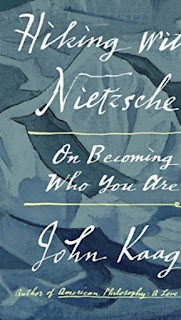Camping With Nietzsche
I have had a great summer thus far. The week before last I was camping high in the mountains of Southern Virginia where thankfully, there was no cell coverage. Being that I am pretty addicted to the phone like 90% of other Americans, getting to a place where cell phone coverage is not present seems to be the only way to escape the grip. My iPrecious...
It is also the same reason I don't keep junk food in the house. If it is around, I will eat it. If I have my phone, I will tweet it. So, getting out away was a hard reset. Frankly, I can take about three days of tent camping. Then, I either go into feral mode and just don't give a rip and embrace the unrefined life of the outdoors, or I have to pack-up and roll out. I prefer the latter. Like Jonah being barfed out of the whale onto the shores of civilization.
With my buddy doing the driving, I had the opportunity to delve into the book above, he had it checked out of the library, and then continued doing so at the campsite. After I came home, I bought it on Kindle and have been working through the last half. Without doing a full-fledged book review, essentially what I have gleaned from it is the author's attempt to explicate and clarify Nietzsche for a modern audience through the author's (Kaag's) own life experiences. Hard to do as Nietzsche is ponderous, grandiose, and mad. According to a close friend of Nietzsche, it was not the rumored untreated syphilis that made him go insane but his ideas.
One quote to demonstrate: " I am no human, I am dynamite."
In reading Nietzsche on my own and this book by Kaag, the German Philosopher believed that Western morality had become herd mentality and the ethic of the slave. The masses of humanity refusing to be who they are, instead becoming bleating sheep hankering for a penned-in pathetic patch of grass rather than the pristine and free Alpine mountain meadow. Suffering was seen as holy and sacred, and God's decree, rather than pitiful and worthy to be scorned. And Nietzsche, to the degree that he was Anti-Semitic, does lay this at the feet of Jewish-Christian dogma. Hitler and the Nazis were essentially street thugs gone national, so they took from Nietzsche that which supported their ideology. So, the Ubermensch or Overman archetype. Triumph of the Will type of deal, survival of the strong over the weak. Mercy is for losers*...
The truly ironic part of Nietzsche is all the while he is writing about man mastering nature through sheer explosive psychic and physical energy, he was sickly and infirmed with debilitating diseases.
And this brings me to my point:
Weakness is not always a choice. We certainly decide to a degree how we are going to live and make decisions about how we think, what we do, etc. Yet, we are essentially on borrowed time. We may be able to extend and elevate the trajectory of our days through exercise and eating healthy, and avoiding bad habits like smoking, yet we all have an appointment with death. So all of Nietzsche's bombastic bravado, some of it quite inspiring, ultimately fizzles into a whimper, and not an explosion. Sparkler more like. Not dynamite.
This has all been brought home to me this week as I still have a crimp in my back from camping. Attempting to get comfortable on my travel mattress, I believe I twisted my back into a pretzel of sorts. After I had finished camping, I went out to Pittsburgh for three days and slept on the padded ground again for another jaunt. Almost a week later, I am still in recovery mode. I ran, lifted, mountain-biked, and kayaked this week. So, I am doing my best impression of a 55 year-old Ubermensch. Yet, my back still aches. Rather than run from the reality that I am getting older and have more aches and pains now, and just am not as flexible and resilient, I am attempting to take it in stride. Albeit, with a limp.
* Whereas Jesus specifically call the merciful blessed and the ones to receive mercy. Mercy seems weak until we need it. And we all do.



Comments